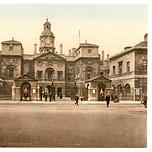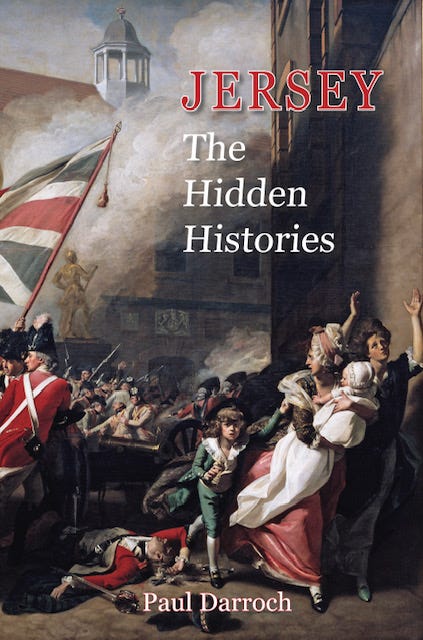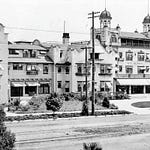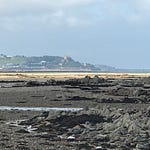It is the Spring of 1781. Jersey has been saved from the invading French army. Yet it was a shockingly close-run escape, and a scapegoat is required. The military trial of the Lieutenant-Governor, Major Corbet, is about to begin… Enjoy this latest episode from the History Islands. ~ Paul Darroch
The Major’s Story: The Court-Martial
Major Corbet
Horse Guards, Whitehall - May 1st, 1781
I am falling from my bed and straight down into hell. The nightmare begins in a cloistered courtroom. The panel of illustrious field officers, immaculate in their regalia, peer at me icily across the dry wall of the dock. Behind their punctilious formality and stony silence, I notice an emotion lurking in their eyes, far more corrosive than the bright fury of anger, or the simple clarity of hatred. Its stench hangs unspoken around me, subtle and humiliating. It is the odour of sheer, pitiless contempt.
I am on trial today in the bowels of Horse Guards, an edifice bleached as white as bone, a modern monstrosity in the Italian style of Palladio. I am cowering here before the Great White Throne of British justice, charged with acting contrary to my duty, to shamefully abandoning my post and delivering my Island over to the invader. My guilt is already proclaimed in a score of London rag-sheets and ten thousand coffee house diatribes. I am the traitor who surrendered Jersey without a fight, and the rest is mere detail.
A chink of light breaks into the heavy wooden tomb of the courtroom, and motes of dust turn and swirl around me, like fragments of memory. The witnesses have shuffled in here one by one, a fearful carnival of wretches doing their best to flatter themselves and drag me down. The goldsmith and the brandy-seller, the common soldier and the ambitious captain, have each unburdened their twisted tangle of memories before the court. Dragged far off their native Island, they thrash like fish out of water, prised open by the legal pincers of Whitehall. Still, their plodding testimony, be it conjured under oath and the mortal fear of perjury, is slowly conspiring to drown me.
Like a tidal wave, the events of that winter night come flooding back; the night terror of the invading army, that first fall from my bed, my nightcap cast aside, and my chamber pot kicked over. I rose like a man, cutlass in hand to defend my Island, but was soon captured and bound, dragged at gunpoint to face the violent threats of a gentleman thug. You were not standing there in the Manoir de La Motte, with the instrument of surrender dangling like a sweet apple before you. And if I did not take and eat, I faced the bitter threat of atrocities, the spectre of my town set on fire and put to the sword.
The scene is cut deep into my memory. De Rullecourt thrust his watch down on the table, and he gave me thirty minutes before the first executions began. His army, you must remember, was no regular French formation, but a band of brutes and mercenaries far beyond the letter of the law. And I, a proud Jerseyman, had been abandoned by my commanders, left to face this terror while they swanned off for the winter. I have been branded the scapegoat for their folly.
I resisted, procrastinated, demurred, but it was useless. Lieutenant Ganne exploded with frenetic rage, his thick arms desperate to throttle me. Then de Rullecourt’s right-hand man brandished his sabre and threatened to slaughter every man in St Helier. These were bloodthirsty fighters, and they looked ready to do it. So I signed the surrender of Jersey to save my people, nothing more and nothing less. If I condemned myself in so doing, it was a small price to pay.
The court’s clerk, his spine curved into a perfect hoop, scratches and scribbles my crimes impassively in birdlike shorthand on thick reams of parchment. His dull eyes are barely visible behind his glass-bottle spectacles, the silent scribe of a tragic litany of debts, murders and high traitors. He is dead to the world.
The courtroom rattles on now like a stagecoach at full gallop, eager to press on to its final judgement. The wheels of justice are churning fast through the mud and sand of the coast road, the invasion road, where sparks fly like fireflies off the iron wheels at full speed. The tide is surging in hard around me now, choking me, bringing the French boats in, and dispatching the legions to march and surround and strangle St Helier. I try to stammer out my pitiful excuses for the surrender, but my words mangle into sludge in the dry desert of my mouth. My tongue hangs as heavy as a spiked lead cannon, and I am struck dumb.
Judge-Advocate Sir Charles Gould, the King’s favourite, looms over me sly and lean, his pallor as grey as a waxwork. Only his eyes are savagely alive, darting as black as a ferret’s, dissecting me with relish like a prize butterfly. As the Honourable Member for Breconshire, squatting unopposed in his own rotten borough, he dares to call my command of a proud Island to account. Trussed up absurdly upon his judgement seat, as powdered and bewigged as a theatre dame, he turns to deliver his verdict.
His thin, aquiline nose quivers a little as he smells some fresh meat, and then he begins to laboriously opine. His chin twitches, barely perceptibly, but a notary, understanding the hidden signal, hands him a velvet cushion. The courtroom gasps. In the centre of the cushion lies a square, black cap, that age-old harbinger of death. I am struck dumb. The motes of dust frolic around me, dancing their last rites in the waning light.
Suddenly Judge Gould rises as high as a mountain above me, and the cap levitates up onto the lofty pinnacle of his wig. Then it thrashes into life, spitting out feathers and blood, a hissing black Corbière crow. I am out on that barren headland now, where the storm fronts crash in like banshees from the Atlantic, wailing over rocks that will surely lacerate and splinter my skull.
Groggy in my nightmare, I rave at the walls of my prison cell. The guards do not stir, for they are no doubt as drunk as my own sentries were on that fateful night. Then I slither back into my thrashing dreams again.
Night terrors continue to lurch at me like drunken convicts, until I am quivering like a fish, lying stinking in sweat-soaked terror. Now the dreamscape twists and turns, into the searing white light of a Palladian palace and the shadow of the noose on the raked yellow sand of the execution yard. I end my dreams as a delicate and bejewelled bird, hammering up against the walls of a gilded white cage, waiting for my wings to be torn.
Eventually the fluttering dies, and the pulsing of my blood slows. Then the sun finally rises over Horse Guards, and as the night horrors recede, the dull ache of reality returns. My court martial will indeed begin today. I wake to the sound of distant footsteps echoing down the white stone corridors, ringing the alarum like the hooves of an approaching army.
The wheels of justice turned, and they yielded an elegant and quintessentially British verdict. The gallows or transportation would be an unsuitable fate for a well-meaning albeit manifestly incompetent commanding officer. Besides, it would be most awkward if the blatant absenteeism of his superiors was to be dragged before the attention of the Court. A noble, self-effacing plea for clemency and a dignified silence on more delicate matters would offer the best defence.
Corbet duly coughed up his Lieutenant-Governorship and was shunted off into the silent ostracism of obscurity. His vanishing act was sweetened by a surprisingly generous pension of £250 per annum. The man who lost Jersey for a day died in his eighties, in the bosom of his plump and well-feathered bed.
This story is featured in my first book, Jersey: The Hidden Histories, published by Seaflower Books.
(c) Paul Darroch 2015, 2021















